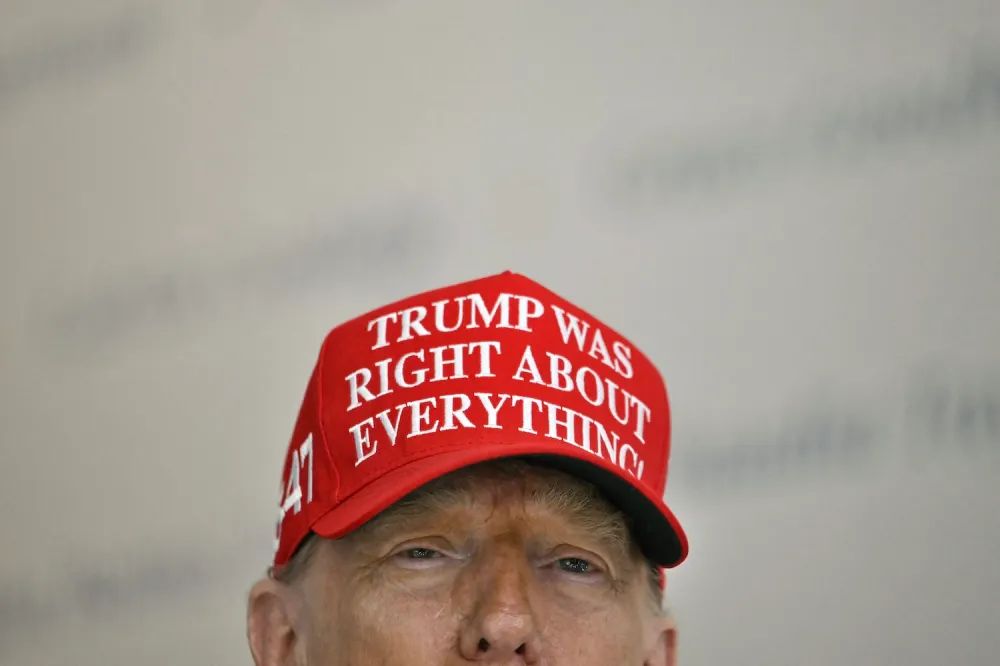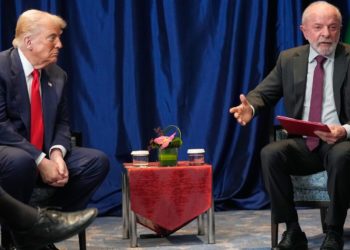By attempting to fire Federal Reserve Gov. Lisa Cook this week, President Donald Trump has broken with decades of precedent in American central banking. Governors are appointed for 14 years, specifically to insulate them from political pressure. Trump’s actions are now raising fundamental questions not only about the direction of Fed policy, but about the basic constitutional foundations of its work.
What practical effects does the Federal Reserve’s independence have on its monetary work? What effect does political pressure have on interest rates? And what would an explicitly politicized Fed look like?
Those are just a few of the questions that came up in my recent conversation with FP economics columnist Adam Tooze on the podcast we co-host, Ones and Tooze. What follows is an excerpt, edited for length and clarity. For the full conversation, look for Ones and Tooze wherever you get your podcasts. And check out Adam’s Substack newsletter.
Cameron Abadi: How does the Fed’s political independence affect its practical real-world work?
Adam Tooze: In everyday life we all completely understand what this is about. This is about the question of whether or not you have to continuously demonstrate and prove, by some rather blunt-force means, the fact that you are serious in your commitment or promise to some future course of action. And the basic issue here is timing consistency. We might all agree that in the long run we’d be better off doing X, Y, or Z. But the question is, do you have what it takes, the courage, the fortitude, the consistency, the credibility to carry through in the short run on what in the longer run is clearly necessary? And then if you don’t, then you’re going to have to do things in the short run to prove to people that you are really committed to that long-run policy. And those are going to be expensive. And so the price of lacking credibility is the violence of the things you have to do in the short run for the sake of demonstrating to people that you’re serious.
In monetary policy, it’s all about the fact that to control inflation, you need to manipulate interest rates, and you need to raise them to slow the economy down. But do we believe that politicians with an eye to the next election cycle will be willing to take the short-run price of the long-run benefit of lowering inflation? Or would they rather just juice the economy in the short run to benefit themselves, say, in the midterms in 2026, with a bunch of low interest rates, even though we know that in 2027 the American voters are going to hate having higher inflation? And so, to ensure that the right decision is taken in 2025 with regard to outcomes in 2027, the idea is it’s better that the people making the interest-rate decision in 2025 don’t have the election in 2026 on their mind so they can stay focused on 2027.
Which is why where we’re looking in the markets for the reaction here is not even in the short-term debt, it’s in like long-term bonds. Because what we’re really asking is does American politics any longer have the patience, the self-restraint, the elite consensus, you could say, that it’s worth paying and agreeing to collectively pay a price in the short run for the long-run benefit of price stability on a credible basis? Or are we going to have to go on the roller coaster? And the roller coaster historically is the ’70s. This is what everyone is going to be thinking about. And the Volcker shock of 1979, when after a decade of really high and accelerating and unstable inflation, the Fed demonstrated that it was credibly committed to price stabilization and the strength of the dollar, and to do so stuck interest rates up into the teens, massacred American manufacturing, and demonstrated and earned credibility. That’s what’s on the line.
CA: It’s not unprecedented for political officials to put pressure on the Fed—what have the effects been in the past?
AT: There’s a great paper on this question by Professor Thomas Drechsel of the University of Maryland—it’s a combination of history and economics and econometrics. Basically, what he does is to go through the diaries of the presidents since FDR [President Franklin D. Roosevelt], match them with the diaries of the Federal Reserve chairs, and establish just how many times they spoke with each other and for how long they spoke with each other. And if you do this exercise, you see that there’s this huge spike in interaction between America’s most senior politicians and most senior monetary policy decision-makers from the late ’60s through to the Carter administration, when it suddenly collapses. But in that phase, there is really astonishingly regular interaction. I think [President Richard] Nixon in a bad year would speak to his Federal Reserve chair more than once a month and at great length. He was clearly belaboring him; we know from the White House tapes how aggressive those conversations were. And the consequences for, as the paper shows with elaborate and sophisticated econometrics, the consequences of the price level were real. So the more the presidents bend the ear of Federal Reserve chairs, the higher the American price level. And the whole thing is hugely skewed, I think, by the fact that there was just this massive concentration of pressure in the late ’60s and ’70s, which is also a period of really rapid inflation.
And no doubt there’s cause and effect here that disentangling is—you know, this is the art of econometrics—that it’s a very powerful effect. And that for that reason, really already under [President Ronald] Reagan, but then massively under [President Bill] Clinton, who barely talked to the Fed chair at the time, that was [Alan] Greenspan, but also under [President Barack] Obama, who spoke far less to [Ben] Bernanke than I would have imagined, given the circumstances of 2008, there’s been really a very considerable distance between the White House and the Fed, which is surprising given how close they are in Washington. So there was really a kind of limit. It has to be said that the paper uses a very old-fashioned measure of influence. This is for the Twitter age, right? This is before presidents would wake up at 2 in the morning and say, “I’ve got to have a go at my Fed chair,” which is the current mode of interaction. So it doesn’t capture that kind of bullying. It’s an inside-power kind of measure.
And it’s pretty clear that Trump is, you know, this is next-level stuff, what Trump is trying to do here. The aim of the game, I think, it’s fair to say, at least on Trump’s behalf, is pretty straightforward. He just wants lower interest rates. And I think if [Fed chair Jerome] Powell had a track record of giving him that swiftly, going back to his first term in office, this might not be happening. Because I don’t really think that Trump is, himself at least, after the constitutional shift which is implied here. But his ambitions may have expanded, it is hard to read his mind, and certainly the ambitions of his team have such that really what they’re about here is a massive extension of presidential prerogative, a massive extension of presidential power to a really ridiculous—I mean, many people will have seen the long, long recording of the recent cabinet meeting, which really does go down as a low point in American political culture. Anyway, so there’s a different dimension to this in that the GOP is involved in an outright and completely blatant, they discuss it explicitly, essentially Fed-stacking effort. And they’re trying to do it both directly at the national level, and then perhaps even more dramatically at the regional level. People thought the move against Cook was motivated by needing to get a majority in the Washington Fed so as to then influence the regional Fed appointment process. But apparently, they’re going after the regional Feds directly at the same time. It’s an effort to really assert comprehensive partisan control over the apparatus of money creation and financial regulation. It’s quite something.
CA: What would an alternative to independent central banks look like? Is it possible then to imagine governors like Lisa Cook getting elected by the public in some kind of organized election? Or, you know, should monetary policy, this pretty sort of arcane technical field, be a more constant presence in our political discourse?
AT: Yeah, I mean, I’ve long argued that we need to acknowledge the politics of central banking. It is maybe arcane, as you say, but it actually intrudes into everyone’s lives all the time, from credit cards to mortgages to all forms of credit. It’s there whether you like it or not, whether you choose to recognize it or not. And there have been periods, notably in American history, in which the politics of money have been far more intelligent, far more articulate, far more central, far more salient than they have been recently. And I do take this to be a kind of vicious circle whereby from the ’70s onward, there was a push to make central banks independent and to remove monetary policy from, quite literally insulate it from, democracy. They said as much. That’s exactly what they set out to do. And as a result, kind of democracy has become a bit lobotomized, if you like, when it comes to economic policy, because it can’t actually think or talk about the things that matter most.
And monetary policy is the single most effective, I think, you know, instrument at least of fine tuning and immediate intervention. It’s the most fast- and direct-acting. Fiscal policy can be very powerful, but it’s slow by comparison. And industrial policy, even more haphazard and slow. So yes. How to do it is the question. And there was always a risk. In other words, if you are going to politicize and democratize, you really need to make sure you’re going to win. And what we’re seeing is the consequence of the Democrats being very bad at politics, very bad at democratic politics and losing. What I think the Republican move now has done is—well, one lot of folks are going to, on the progressive side, say we need to dig in and defend independent central banking, which I think would be the wrong way to go. We had Paul Krugman on his blog newsletter the other day citing Spartacus in defense of Lisa Cook, which I think is a bit rich.
My preference would be to go toward a more overt embrace of, exactly as you say, both an institutional set of changes that would put questions like the priorities of central banking, its mandates, and issues like minority unemployment explicitly up for debate and discussion. In what forum would have to be decided. It could be in Congress. It could be a dynamization and an opening up of what is already an oversight capacity on the part of Congress, which is currently very ritualistic and not really taken terribly seriously, and could be turned into a real forum. One would have to talk about how governors are appointed. At the central level, it’s one thing. At the regional level in the U.S., it’s just a flat-out scandal. Like the leadership of regional central banks in the U.S. is decided by unelected committees of business and banking interests in those regions. It’s the most extraordinary elite cabal, and it should be unacceptable in that form. And I think that periodic review is really the key. I’m kind of influenced here by a political theorist called Leah Downey who’s written a book which has the great subtitle, “Monetary Policy as if Democracy Matters.” And that, I think, really is the challenge of the current moment.
So I think periodic review, intensified review, an expansion of the range of things that can be discussed, and exactly as you pointed toward, the deliberate effort, notably on the part of progressives who must have an existential interest in this, to cultivate a serious politics of central banking. I mean, if you read William Jennings Bryan’s speech to the Democratic Party convention in 1896, at a time where universal literacy could not be assumed, it’s enough to reduce you to tears, the sophistication of that speech, the range of historical reference, the assumption on his part about what his audience could be assumed to be able to think through in terms of politics, history, and monetary economics is just dazzling by comparison with anyone in recent decades. It’s really, it’s really a profound, you know, marker of the decline of American political culture. So it’s a big ask, but it doesn’t seem to me that we’re really left with much alternative at this point.
The post Trump’s Assault on the Federal Reserve appeared first on Foreign Policy.




